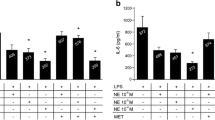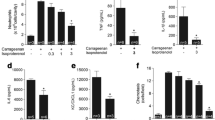Abstract
Objectives: a) To investigate the functional consequences of sepsis on the β-adrenergic signal transduction in human circulating lymphocytes; b) to appreciate sepsis-associated catecholamine and cytokine release. Design: Experimental, comparative study. Setting: Research laboratory in a university hospital. Subjects: Healthy controls (n = 10); critically ill patients who were not septic (n = 7); septic patients with severe sepsis or septic shock (n = 11). Measurements and main results: Experiments were carried out using freshly isolated peripheral blood mononuclear cells (PBMC). We measured β-adrenergic receptor (βAR) number and affinity, and intracellular cAMP content at baseline and after the pharmacological stimulation of each component of the β -adrenergic complex: βAR with isoproterenol, Gs-protein with sodium fluoride (NaF), adenylate cyclase with forskolin. Catecholamine (adrenaline, noradrenaline) and cytokine (TNFα, IL-1α, IL-1β , IL-6) serum levels were measured. In both septic and non-septic patients we observed a similar 40 % down-regulation of βARs compared to controls, and a reduced basal and isoproterenol-stimulated cAMP accumulation (p < 0.05). The cAMP production elicited by NaF or forskolin was lower in septic patients than in the controls (p < 0.01). Forskolin-stimulated cAMP accumulation was significantly lower in septic patients than it was in non-septic ones (p < 0.001). Catecholamine serum concentrations were increased in the two patient groups without any significant difference. Elevated cytokine serum levels were detected in 45 % of the septic patients (versus 14 % of non-septic patients p < 0.05). Conclusions: Patients presenting with severe sepsis or septic shock have extended postreceptor defects of the β-adrenergic signal transduction. This finding suggests a heterologous desensitization of adenylate cyclase stimulation.
Similar content being viewed by others
Author information
Authors and Affiliations
Additional information
Received: 5 January 1998 Accepted: 24 August 1998
Rights and permissions
About this article
Cite this article
Bernardin, G., Strosberg, A., Bernard, A. et al. β-adrenergic receptor-dependent and -independent stimulation of adenylate cyclase is impaired during severe sepsis in humans. Intensive Care Med 24, 1315–1322 (1998). https://doi.org/10.1007/s001340050768
Issue Date:
DOI: https://doi.org/10.1007/s001340050768




